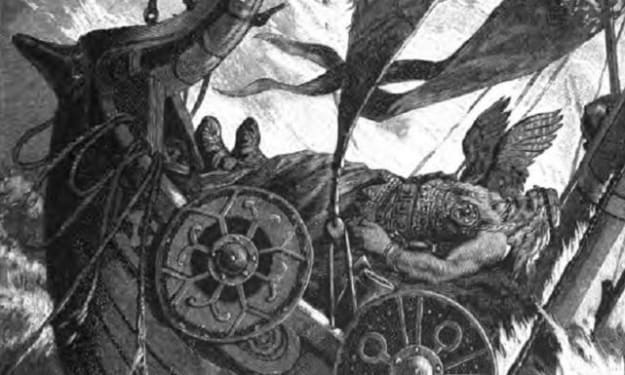Alfred the Great:Architect of English History
Alfred the Great

Alfred the Great, a name deeply ingrained in the annals of English history, evokes sentiments of bravery, sagacity, and fortitude. In the year 871, Alfred assumed the throne of Wessex, inheriting a kingdom teetering on the edge of ruin. Through unwavering resolve and astute tactics, his reign earned him the revered title of "the Great." Alfred's lasting impact as the rescuer of Wessex lies in his extraordinary aptitude to convert hardship into victory, ultimately safeguarding the essence and character of his realm.
Early Life and Education
Alfred was born in the village of Wantage in Berkshire in the year 849, the youngest among King Ethelwulf of Wessex and his first wife, Osbur's five sons. Unlike his older brothers who were being prepared for kingship, Alfred was not groomed for the throne. Consequently, he had the liberty to explore his intellectual and personal interests. This freedom enabled Alfred to dedicate himself to education and learning, nurturing a profound passion for knowledge and culture that would ultimately shape his reign.
Alfred's formative years were characterized by instability and upheaval, as his kingdom grappled with the relentless onslaught of Viking invaders who had already conquered the ancient realms of East Anglia and Northumbria. The neighboring monarchs fell one by one, leaving Alfred as the sole beacon of hope for the survival of the Saxon kingdom. In the year 853, at the tender age of four, Alfred accompanied his father, King Ethelwulf, on a journey to Rome, where he received confirmation from Pope Leo IV. However, upon their return in 856, Ethelwulf was overthrown by his own son, Ethelbald, and Alfred's elder brother, a power-hungry prince driven by ambition. This audacious act by Ethelbald plunged the kingdom into uncertainty and paved the way for a period of political turmoil within Wessex.
The Political Upheaval
The political upheaval resulting from the usurpation had far-reaching consequences, affecting not only the political landscape but also the personal lives of those in close proximity to the throne, including a young and impressionable Alfred. The familial discord and power struggles left an indelible mark on Alfred's perspective, instilling in him a profound sense of caution, resilience, and determination.
However, the beginning of Alfred's reign was far from easy, as his older brother Ethelred ascended to the throne amidst relentless Viking invasions that threatened the stability of Wessex. These raids required strategic thinking and military expertise, and internal dynastic conflicts within Wessex only added to the complexity of Ethelred's rule.
The Viking Threat
During Ethelred's reign, the Viking threat persisted, as the "Great Heathen Army" arrived in East Anglia seeking vengeance for their father, Ragnar Lothbrok. This formidable Viking force, led by renowned warriors such as Ivar the Boneless, Sigurd Snake-in-the-Eye, and Halfdan, aimed to conquer and establish themselves in England. As the Vikings advanced through Northumbria and East Anglia, Alfred and his brother, Ethelred, took charge of a substantial West Saxon army to confront them. The battles against the Vikings were characterized by exceptional brutality, strategic brilliance, and an unwavering determination that would ultimately determine the destiny of the nation. These encounters reflected the immense stakes involved, as the very survival of Wessex and its cultural heritage hung in the balance.
King Ethelred's Defiance
King Ethelred demonstrated exceptional defiance in the presence of this unparalleled Viking menace. He organized his troops, fortified towns, and confronted the Great Heathen Army in a series of intense battles. The gravity of these clashes reflected the high stakes, as the very survival of Wessex and its culture hung in the balance. Alfred actively participated in the war effort against the Vikings, acquiring valuable military skills and tactical knowledge. He acquired expertise in warfare, strategic planning, and the significance of adaptability when facing an unrelenting adversary. Alfred's determination and courage served as an inspiration to his people, showcasing the resilience of the Anglo-Saxon spirit. Despite enduring devastating defeats and the loss of significant territories, Wessex refused to surrender. The resistance displayed by Ethelred, Alfred, and their people was unparalleled. The Battle of Edington in 878 marked a turning point. Alfred's strategic brilliance and unwavering determination led to a decisive triumph over the Vikings, culminating in the signing of the Treaty of Wedmore.
Alfred's Transformative Leadership
Alfred's triumph at Edington enabled him to solidify his authority, strengthen his realm, and establish the groundwork for the eventual consolidation of England under the rule of Wessex. He bolstered the defenses of his kingdom, formed a navy to safeguard against Viking incursions, and implemented military reforms. Alfred proved himself to be not only a formidable warrior but also a shrewd administrator who championed justice and order, instituting a code of laws. Moreover, Alfred's dedication to education and scholarship left an enduring impact. He orchestrated the translation of books from Latin to Anglo-Saxon, underscoring the significance of knowledge and culture. Alfred's leadership extended beyond the battlefield; he was also a unifying force and a visionary who laid the foundation for a robust, centralized monarchy in England.
Legacy and Continuing Leadership
Alfred's heroic resolve and unwavering determination to save England from the Vikings have left an enduring impact on the nation's history. His legacy of strong leadership and unification continued under his son Edward the Elder, who built upon the foundation laid by Alfred's struggles and triumphs. The lasting legacy of political stability and national unity that Alfred left behind serves as a reminder of the power of courage, determination, and leadership in safeguarding a nation's future. The memory of Alfred the Great lives on as a testament to the resilience of the Anglo-Saxon spirit and the enduring legacy of a truly great king.
The Scholarly Side of Alfred
While Alfred is often celebrated for his military prowess and leadership, his contributions to the intellectual and cultural development of England should not be overlooked. A true Renaissance man of his time, Alfred was a patron of learning and a promoter of knowledge. He recognized the importance of education and the preservation of knowledge as essential components of a thriving society.
Educational Reforms and the Translation Movement
Alfred's commitment to education is evident in his efforts to reform the educational system in Wessex. He believed that a well-educated populace was crucial to the prosperity of his kingdom. To this end, he embarked on a mission to improve literacy and access to learning. Alfred ordered the translation of several important texts from Latin into Old English, making knowledge more accessible to his people.
One of the most notable works translated during his reign was Bede's "Ecclesiastical History of the English People." This translation made this historical and religious text available to a wider audience, ensuring that the history and culture of the English people could be more readily studied and understood.
The Alfred Jewel
One of the most iconic artifacts associated with Alfred's reign is the Alfred Jewel. This small, ornate object is a testament to Alfred's commitment to education and his interest in the pursuit of knowledge. The Alfred Jewel is a beautifully crafted piece of jewelry that contains a small, circular inscription. It is believed to have been the handle for a pointer used for reading, emphasizing Alfred's dedication to literacy and learning.
The inscription on the jewel is a dedication to Alfred, the "king of the Anglo-Saxons," and it serves as a reminder of his contributions to education and culture. The Alfred Jewel is a tangible symbol of his legacy, highlighting the connection between his leadership and the intellectual development of his kingdom.
The Legacy of Alfred's Educational Reforms
Alfred's commitment to education had a profound and lasting impact on the development of English culture and society. His efforts to translate important texts into Old English allowed for a broader dissemination of knowledge. This, in turn, contributed to the development of a shared literary and cultural heritage among the English people.
The importance of education and the preservation of knowledge would remain central to the English identity. Alfred's influence on education can still be seen today in the importance placed on literature, history, and the arts in English society.
Alfred's Contribution to Legal Reforms
In addition to his educational endeavors, Alfred the Great made significant contributions to the legal system in Wessex. His commitment to justice and order led to the development of a code of laws that would serve as a foundation for legal reforms in England.
The Legal Code of Alfred the Great
One of Alfred's most notable legal achievements was the formulation of a code of laws that would be applied throughout his kingdom. These laws were rooted in a sense of fairness and aimed to provide a framework for resolving disputes and administering justice. Alfred's legal code covered a wide range of issues, including property rights, theft, and even marriage. It sought to create a more just and orderly society.
Alfred's legal code was comprehensive and forward-thinking for its time. It aimed to protect the rights of individuals and ensure that justice was administered fairly. This commitment to the rule of law and justice helped to create a more stable and orderly society in Wessex.
The Lasting Impact of Alfred's Legal Reforms
Alfred's legal code had a lasting impact on the development of English law. While the specific laws and regulations evolved over time, the principles of justice and fairness laid out in Alfred's code continued to influence legal thought and practice in England. The emphasis on the rule of law and the protection of individual rights would become enduring features of the English legal system.
Alfred's commitment to justice and order contributed to the development of a legal tradition that would play a pivotal role in the evolution of English society and government. His legacy in the realm of legal reform endures in the principles that underpin the English legal system.
The Enduring Legacy of Alfred the Great
Alfred the Great's impact on England extended far beyond his military victories. His commitment to education, the preservation of knowledge, and the development of a legal system laid the foundation for a more enlightened and just society. The enduring legacy of his reign can be seen in the continued emphasis on education, culture, and the rule of law in English society.
Alfred's ability to transform a kingdom on the brink of ruin into a unified and thriving nation is a testament to his leadership and vision. His unwavering determination in the face of adversity, particularly in the battles against the Viking invaders, showcases his courage and resilience. Alfred's legacy of strong leadership and unification continued under his son Edward the Elder, who built upon the foundation laid by Alfred's struggles and triumphs.
The lasting legacy of political stability and national unity that Alfred left behind serves as a reminder of the power of courage, determination, and leadership in safeguarding a nation's future. The memory of Alfred the Great lives on as a testament to the resilience of the Anglo-Saxon spirit and the enduring legacy of a truly great king.
Alfred's Influence on English Monarchy
Alfred's reign marked a crucial turning point in the history of the English monarchy. He is often regarded as the first true King of England, as his leadership and reforms laid the groundwork for a centralized and unified kingdom.
The Unification of England
One of Alfred's most significant achievements was his role in unifying England. Prior to his reign, the land was divided into various kingdoms and territories, each with its own ruler. Alfred's victories over the Viking invaders and his ability to consolidate his power in Wessex allowed him to extend his authority over other English kingdoms.
Through a combination of military conquest and alliances, Alfred was able to assert his influence over much of England. This unification marked the beginning of a more centralized and cohesive English state.
The Burghal System
To defend his kingdom against Viking incursions, Alfred implemented a system of fortified towns known as burhs (or boroughs). These burhs served as defensive strongholds and centers of administration. They were strategically positioned to provide protection for the local population and to coordinate the defense of the realm.
The burghal system not only bolstered the defenses of Wessex but also contributed to the organization and governance of the kingdom. These fortified towns played a pivotal role in maintaining order and security, and their influence extended well beyond Alfred's reign.
The Role of the Monarchy
Alfred's reign saw a significant increase in the power and authority of the monarchy. While the king had always played a central role in English society, Alfred's efforts to unify the kingdom and establish a more organized system of governance strengthened the position of the monarchy.
The king became the focal point of authority and justice in the kingdom. Alfred's commitment to the rule of law and the development of a legal code reinforced the idea that the king was responsible for upholding justice and order.
The Concept of Kingship
Alfred's reign contributed to the evolving concept of kingship in England. He emphasized the importance of a just and virtuous king who ruled for the benefit of his people. This concept of benevolent kingship would become a prominent feature of English monarchy in the centuries that followed.
The idea of the king as a protector and guardian of his realm and subjects became deeply ingrained in the English monarchy. It was a concept that would continue to shape the role of the monarchy in English society and politics.
The Enduring Legacy of Alfred's Influence
Alfred's influence on the English monarchy had a lasting impact. His efforts to unify England, strengthen the power of the monarchy, and promote the concept of just and virtuous kingship helped shape the trajectory of English history.
The monarchy would continue to evolve and adapt over the centuries, but the foundations laid by Alfred during his reign played a pivotal role in the development of the English state. His legacy as a unifier and a promoter of the rule of law remains a significant part of the historical tapestry of England.
Conclusion
Alfred the Great, a truly remarkable figure in English history, left an indelible mark on the nation. His legacy extends far beyond his military victories and includes his contributions to education, culture, and the development of the legal system. Alfred's ability to unify England and strengthen the monarchy set the stage for the future development of the English state.
His reign serves as a reminder of the power of leadership, determination, and the pursuit of knowledge. Alfred's enduring influence continues to be felt in the values and principles that underpin English society and government. The memory of Alfred the Great lives on as a testament to the resilience of the Anglo-Saxon spirit and the enduring legacy of a truly great king.
About the Creator
Johnny Six
I'm a devoted stay-at-home mom, passionate about alternative education and homeschooling. My daughter is my focus, and together, we explore various hobbies,cooking, art, nature, reading, and music. https://helsprintsandthings.etsy.com






Comments
There are no comments for this story
Be the first to respond and start the conversation.